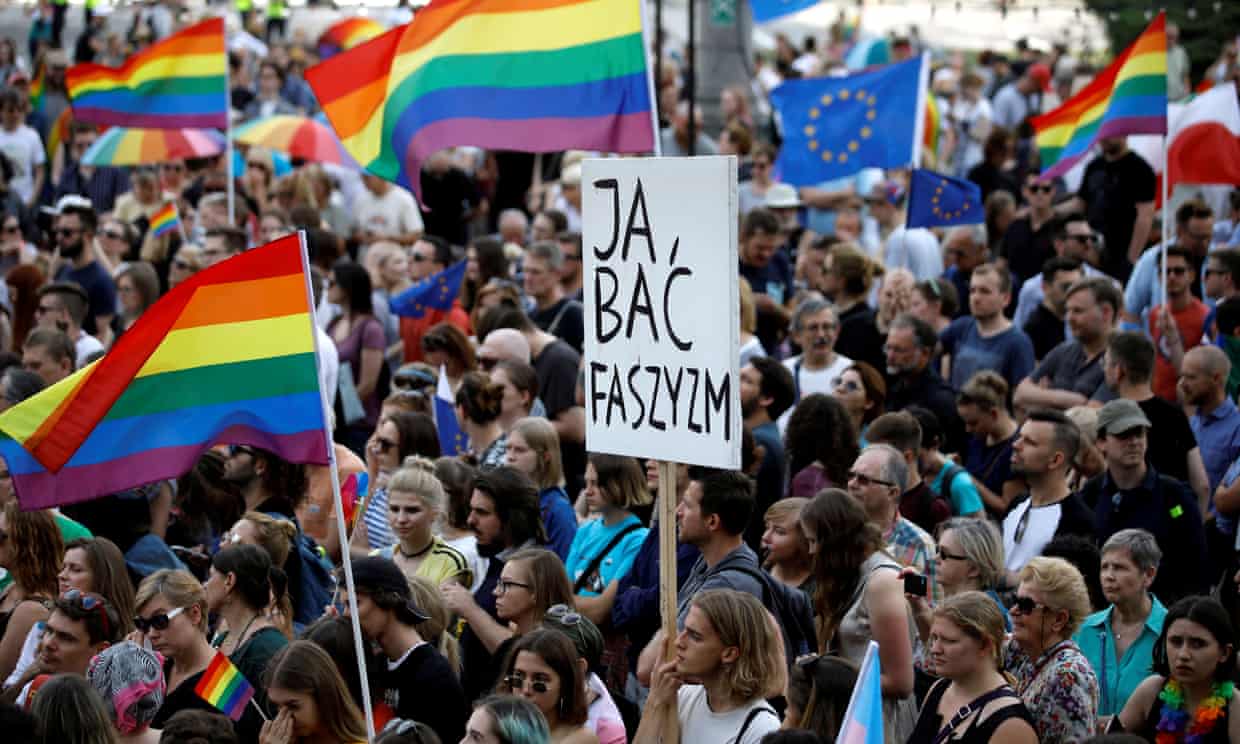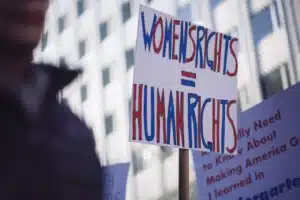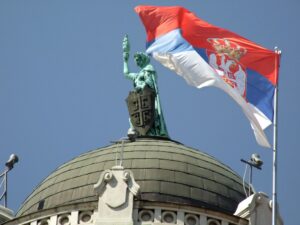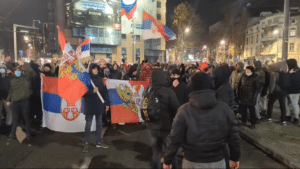A rainbow flag and a European flag can be seen at a protest in Warsaw, Poland, against anti-LGBT violence in 2019. Photograph: Kacper Pempel/Reuters
Last week, on May 21st, Serbian media reported that Nikola Zurovac, the Serbian ambassador to Poland, was recalled from his role because he did not consult with the ministry or government before signing a letter in support of the LGBT+ community in Poland.
The situation of LGBTI people in Poland
The LGBTI community in Poland has for years been under attack, as the right-wing government in Poland has been restricting women’s rights and the rights of the LGBTI community. The campaign against the LGBTI community in Poland started in October 2018. Lesbian, gay and transgender people became a dominant issue during that year’s presidential elections, as President Duda degraded and scapegoated the LGBTI community on his way to election victory. This included claims that LGBT people were “not people, but ideology” and other attempts at dehumanisation.
Lesbian, gay, bisesxual and transgender people face widespread discrimination in Poland. The annual report published this month by ILGA-Europe – the advocacy group promoting the rights of LGBTI people at the European level – signals that by the end of 2019, over 80 local governments had declared that they are “LGBT-free zones” or “free from LGBT ideology”. In 2020, this number has further increased to 94, meaning that one third of Poland stood against LGBTI people.
Two years later, the European Union declared itself an “LGBTIQ freedom zone” in a symbolic protest against the discriminatory policies in its Member State Poland. The resolution states that LGBT+ people “everywhere in the EU should enjoy the freedom to live and publicly show their sexual orientation and gender identity without fear of intolerance, discrimination or persecution”.
Dismissal of the Serbian ambassador
Mr Zurovac was among diplomats from 40 countries to call for the protection of the rights of the LGBT+ rights in Poland. The letter was published to mark International Day Against Homophobia, Biphobia and Transphobia, which is celebrated on 17 May. The diplomats shared their support for the “efforts to raise public awareness of issues that affects” the LGBTI community in Poland.
On the 20th of May, Nikola Selaković, the Serbian minister of foreign affairs, announced that Zurovac was recalled from his post and would now return to Serbia. Selaković reiterated the reason for dismissing Zurovac was not because of the content of the letter but because he did not follow the proper procedure before he signed it. He said: “The ambassador did not inform anyone about that. We are not talking about the subject of the letter and its content.”
Selakovic was supposed to visit Poland this week, but Polish officials have now postponed his planned meetings in Warsaw. It is suggested that conservative authorities in Poland postponed the visit in response to negative Polish tabloid coverage about ambassador Zurovac signing the letter. There is speculation that this is the real reason for Selaković’s decision to remove Zurovac.
Still a way to go for Serbia
The Belgrade-based Centar Modernih Veština or Center of Modern Skills – which promotes social-democratic values and human rights in Serbia – regretted the fact that minister Selaković refused to position himself on the letter’s content, calling his silence “the essence of the problem.” The Center condemned the Serbian government in a response: “With his brave signature, [Zurovac] included our country in progressive democratic countries that respect and promote human rights… Once again, the Government of Serbia, with its double standards, pushes Serbia away, value-wise, from the progressive forces within the EU.”
Although Ana Brnabic became Serbia’s first woman and first openly gay Prime Minister of Serbia in 2017, rights groups claim she has done little to further the rights of the Serbian LGBTI community, which still faces widespread discrimination and often hostility. Serbia still does not accept same-sex civil partnerships or allow children’s adoption by same-sex couples.
Sources: PinkNews, BalkanInsight, Center of Modern Skills.



